Changes in diversity, equity and inclusion (DEI) programs, directed by the Iowa Board of Regents, are taking effect at the three regent institutions. Universities will see the implementation plan for these directives at the regents’ next meeting. While the full plan is yet to be made public, students and staff are anticipating more change in DEI programs and positions at Iowa State.
In anticipation of the regents’ meeting April 24-25, some students feel the directives are casting a bad light on Iowa State, while some faculty say the impact will not be as bad as some think.
How will this affect students?
Odosasere Amadasun, a junior in sociology, and Lyric Sellers, a sophomore in communication studies, participated in and presented research at the 2024 Iowa State Conference on Race and Ethnicity (ISCORE) in February.
The pair’s project, titled “The Importance of Diversity, Equity and Inclusion in Higher Education” detailed the effects on marginalized and minority students at Iowa State from the recent DEI directives issued by the Board of Regents. The presentation also included questions from a student Q&A panel, which represented students of different identities.
Amadasun said one of her biggest concerns surrounding the directives is the potential of students facing burnout when having to edit aspects of their daily lives.
“For me at least, that’s where the highest fear would come from, because then not only have other people given up on us, but we’ve given up on ourselves in a sense when there’s no more movement to change these things from happening,” Amadasun said.
Bela Banegas, a senior in data science, said she thought the impact of the directives would be less on current students like herself, and more on students of color in the future, including current freshmen.
For Banegas, a multicultural scholarship offered by Iowa State was the deciding factor for her in making a college decision.
“Because all of these programs are not necessarily being completely trashed, but strategically renamed and the funding is reallocated, those students of color can see that,” Banegas said. “It’s what so many of us are staying here for and why we came.”
The Iowa Board of Regents released a report on DEI programs at the three Regent universities Nov. 7, which included 10 recommendations, now called directives, following a pause of new DEI initiatives in April 2023.
The report was compiled at the direction of the Iowa legislature via the passage of Iowa Senate File 560.
The directives include restructuring the central, university-wide DEI offices, restricting people from being “compelled to disclose their pronouns” and eliminating positions that are not “necessary for compliance, accreditation or student and employee support services.”
The Iowa Board of Regents voted unanimously Feb. 28 to approve revisions to its policy manual, edited to comply with the board’s adopted directives for DEI programs.
Banegas said the directives impact the university and its standing with students when supplemental programs for students of color are reformed.
“Especially when they have trouble graduating [and] achieving STEM degrees because they attain those degrees at a much lower rate,” Banegas said.
Graduation retention data
According to data collected by the Iowa Board of Regents, the gap in six-year graduation rates by race/ethnicity has narrowed over time. Regent documents state that while the gap for the 2016 entry cohort was one of the narrowest on record (9-11 percentage points), a five percentage point drop in the graduation rate for students who identify as racial/ethnic minorities expanded to 13-15 percentage points in 2017.
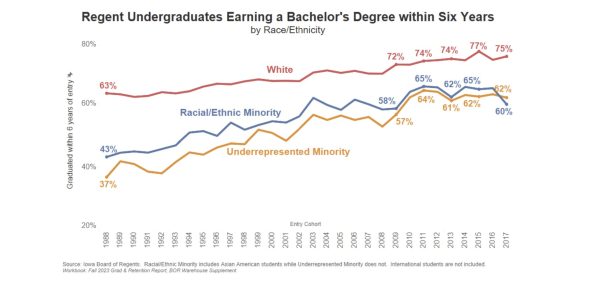
Regent documents state that regent universities consistently outperform national averages among all racial/ethnic groups attending four-year public universities.
Sellers said she thinks the directives make it easier for people to disregard what is important and prevalent in the lives of many students of color.
“While we put in the work and the advocacy to create an environment that supports students of color, we are actively seeing students of color hesitant to remain at Iowa State and also hesitant to come here because they don’t see an environment that considers them or teaches them or is actively trying to support them on their academic journey,” Sellers said.
Ann Oberhauser, professor of sociology, said directives such as those developed by the Iowa Board of Regents on DEI are not happening in a vacuum. Instead, they are all part of ongoing conversations about social justice in broader society.
“The background to some of the DEI directives and efforts by the Iowa State Legislature, and therefore the Board of Regents, to restrict free speech in higher education are linked to executive orders and other measures taken by the Trump administration against so-called ‘divisive concepts’ back in 2019,” Oberhauser said. “Similar approaches have been adopted around the country by different states and target education at all levels.”
Higher education is a place for students to explore these issues and not restrict teaching about social justice and inequality, Oberhauser said, such as discussing the importance of diversity and inclusion among students, within the curriculum and through DEI initiatives at Iowa State.
What changes has the university already made?
According to Inside Iowa State, the President’s Focus Group on the Board of Regents DEI Adopted Recommendations is currently working with the president and senior leaders to provide feedback and help advise on a plan to comply with the recommendations and is composed of faculty, staff, students and administrators.
“Right now, there is a study group addressing the 10 directives to review DEI programs and related work at ISU,” Oberhauser said. “I think the university is trying to maintain its mission because Iowa State recognizes the importance of diversity. We want a diverse student body, diverse faculty. It’s very important in higher education to have multiple perspectives, multiple voices informing and providing role models and instructing. So, I think some of these measures and overall scrutiny make DEI work very difficult in this environment.”
Karen Kedrowski, director of the Carrie Chapman Catt Center for Women and Politics, said the university has already seen some tangible changes surrounding the implementation of the 10 directives, citing pronoun requirements and a change in naming “U.S. Diversity” course categories.
The Faculty Senate voted March 19 to rename the “U.S. Diversity” course requirement to “U.S. Cultures and Communities” to comply with the regents’ directive.
The clause “No employee, student, applicant or campus visitor is compelled to disclose their pronouns. Anyone may voluntarily disclose their own pronouns,” was also approved by the Faculty Senate on March 19 to be included in the Free Expression statement. The Free Expression statement is required to be included in the syllabus for every course, and the additional statement was added to comply with directives from the Board of Regents.
Oberhauser said there is potential for the directives to impact university units and the way faculty teach, including those with missions related to DEI like the Multicultural Student Affairs or the Sloss Center for Women and Gender Equity.
“These offices serve very important roles and are critical areas and spaces for students that need to be supported,” Oberhauser said. “Those offices should be given more, not less resources. I think by drawing attention to or restricting or limiting the operations and impact of these offices, we’re taking away much-needed support for students, staff and faculty.”
Sellers said when it feels like things are at stake, organizing students and gaining trust in leadership can be daunting.
“For me, a concern is while we’re also trying to combat these types of enforcement of policy, we also see how legislation is trying to threaten those who advocate against certain things,” Sellers said. “There’s been things in legislation proposed that would reduce funding and scholarships for people who protest at their universities, and I think that’s something that’s frightening.”
Sellers said she wished Iowa State and the Board of Regents would make students of color a priority.
“It’s very evident that we’re not [a priority] and that they’re very intentional with the decisions that they’re making, and a lot of it is an attempt to police us or silence us or whatever it may be, restrict us from certain opportunities,” Sellers said. “I think it’s evident when you’re being considered and it’s evident when you’re being attacked, and students of color and marginalized students in general in Iowa at public universities are being attacked.”
Banegas said her biggest concern is that the directives are also not prioritizing students with disabilities who may have a harder time at college.
“They’re not hitting the nail on the head,” Banegas said. “There’s nothing being done besides taking from students who need these resources to stay. I feel like to me, it just really seems pretty black and white, and maybe it’s because of multicultural students, but I know that these programs help graduation rates, [and] that provides Iowa State money. I don’t understand what the benefit is of stripping marginalized students of resources that will help them be successful. I don’t understand how it’s a subjective thing.”
Kedrowski said that if these directives are the regents’ last work on DEI, in five years, people will be showing up at Iowa State and having what she thinks will be a fundamentally similar experience to what they’re having now, without the same words attached.
“Of course, my opinions are my opinions. I’m not speaking on behalf of the university or any office,” Kedrowski said. “We are in uncharted territory, but I think that the language from the directives and the Board of Regents was actually very tempered.”
Kedrowski said she thinks there is more implementation to happen and that it is possible these directives may not be the last word from the board. The directives discuss not having a university-wide office of diversity, equity and inclusion, and not tracking data about student success except for what is required by federal law for eligibility for grants or for accreditation, which Kedrowski said were big caveats.
Sharon Perry Fantini, the former vice president of diversity, equity and inclusion, left Iowa State on Oct. 6 to begin a new position outside of the university. When contacted for comment on Perry-Fantini’s departure, strategic relations and communication referred to an Inside Iowa State article.
“A lot of the work that the university DEI office did is going to continue to be done because there’s a mandate to do this and to be thinking about it,” Kedrowski said. “But then secondly, the people who are employed in various DEI offices will probably continue to have to be able to do their work because there are very few where 100% of their jobs are DEI.”
Under federal law, Kedrowski said regent universities must also continue to have an office of accessibility for students with disabilities.
“A lot of people who might have as part of their job been providing support for multicultural student groups, those student groups will continue to exist because our students have freedom of association, so they can create whatever kind of groups they want to,” Kedrowski said. “Advising student organizations is a part of what faculty and staff do as part of our service to the university, just as good university citizens.”
One directive Kedrowski said she thinks could “have enormous potential to do a lot of good” is directive number nine: “Develop a proposal, including cost, to establish a widespread initiative that includes opportunities for education and research on free speech and civic education.”
“Number nine, which talks about exploring a campus-wide initiative on free speech and civic education, for those of us who care a lot about civic education, we know that Americans’ essential knowledge about the Constitution, about the functioning of democracy, about our democratic norms and traditions has been declining for some time,” Kedrowski said.
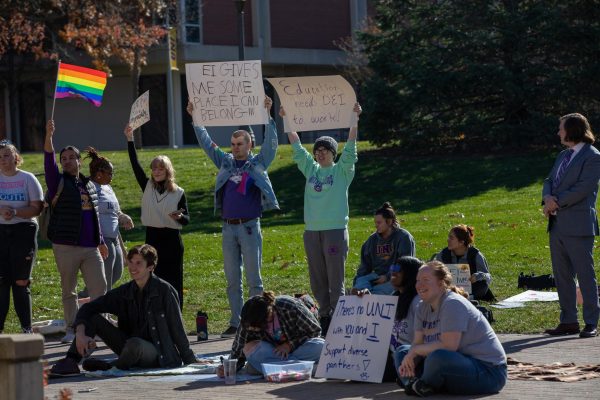
This allows for an opportunity to think carefully about what Iowa State students, faculty and staff can do to make an impact on campus conversation, Kedrowski said.
Kedrowski said she hopes the subject is closed after this implementation of the directives is finished and that Iowa State can then move on with its primary purpose, which she said was to educate students, do research and improve the state of Iowa.
Oberhauser said some of the directives look at where funding goes for positions related to
DEI.
“Our department and college have many DEI initiatives,” Oberhauser said. “I think in a very positive way, these DEI efforts permeate the university and maintain this accountability at each level to make sure that we’re doing things right in this arena, and to ensure our environments are inclusive, diverse and not uncomfortable for people of color and other underrepresented groups.”
Kedrowski said she thinks by the time the dust settles, there will be less change in university day-to-day life than what some people fear.
However, Kedrowski said she does not know of anyone on campus who likes the fact that Iowa State is undergoing this process, although she thinks there are probably some who may not be as outspoken.
“Having said that, I really respect that the people who are working on it are taking a careful look,” Kedrowski said. “They’re not responding emotionally. A lot of people of course are angry, but they are people who have expressed anger that I don’t think our leadership necessarily disagrees with, but this is a directive from the regents, we got to do it. So how can we do it in a way that is consistent with our mission and allows us to get back to what we really want to be doing with minimal impact on the institution?”
While there will not be a DEI office, Kedrowski said, there will be people in institutional research collecting information on student success and breaking it down by demographic variables, which is required by law.
Additionally, organizations like the Multicultural Student Center are making internal changes, and Kedrowski said the organization has just edited its mission statements slightly to say that all students are welcome.
“We know that it is going to attract some students more than it’s going to attract others, but there won’t be any inadvertent communication that things aren’t open to them,” Kedrowski said. “So, I don’t see that it is going to be as bad as some fear, but there is a cost in terms of just the sheer amount of time and effort that people around campus have been putting into working on this project.”
When asked for comment on how Iowa State can expect to be impacted by the implementation of the directives, Josh Lehman, senior communications director for the Iowa Board of Regents, stated that, “The three universities were charged by the Board at its November 2023 meeting to report back publicly to the Board at its April 2024 meeting on their progress of implementing the remaining DEI directives. We look forward to their presentations.”
Angie Hunt, media relations in the department of strategic relations and communications, stated Iowa State’s full implementation plan will be shared at the April 24-25 Board of Regents meeting.


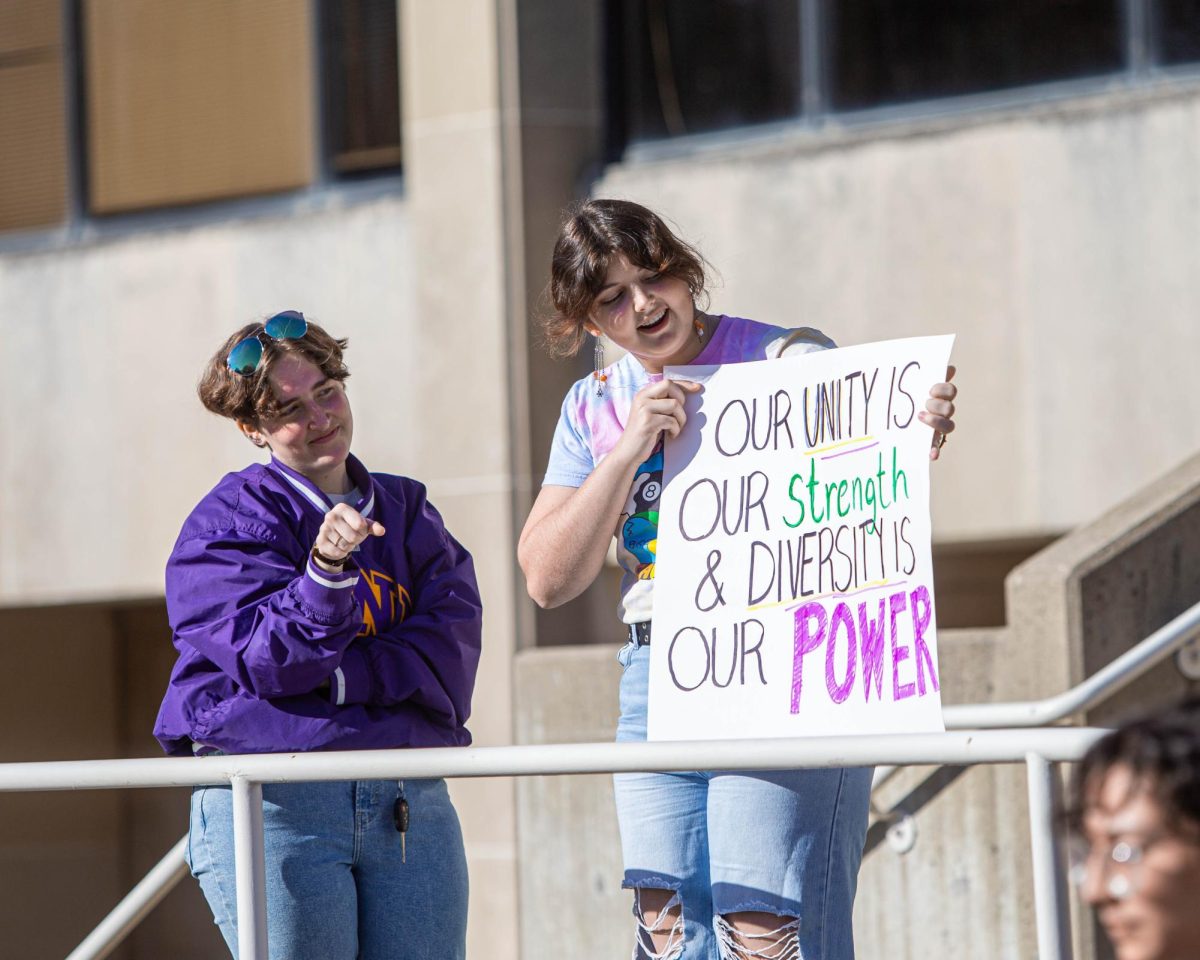
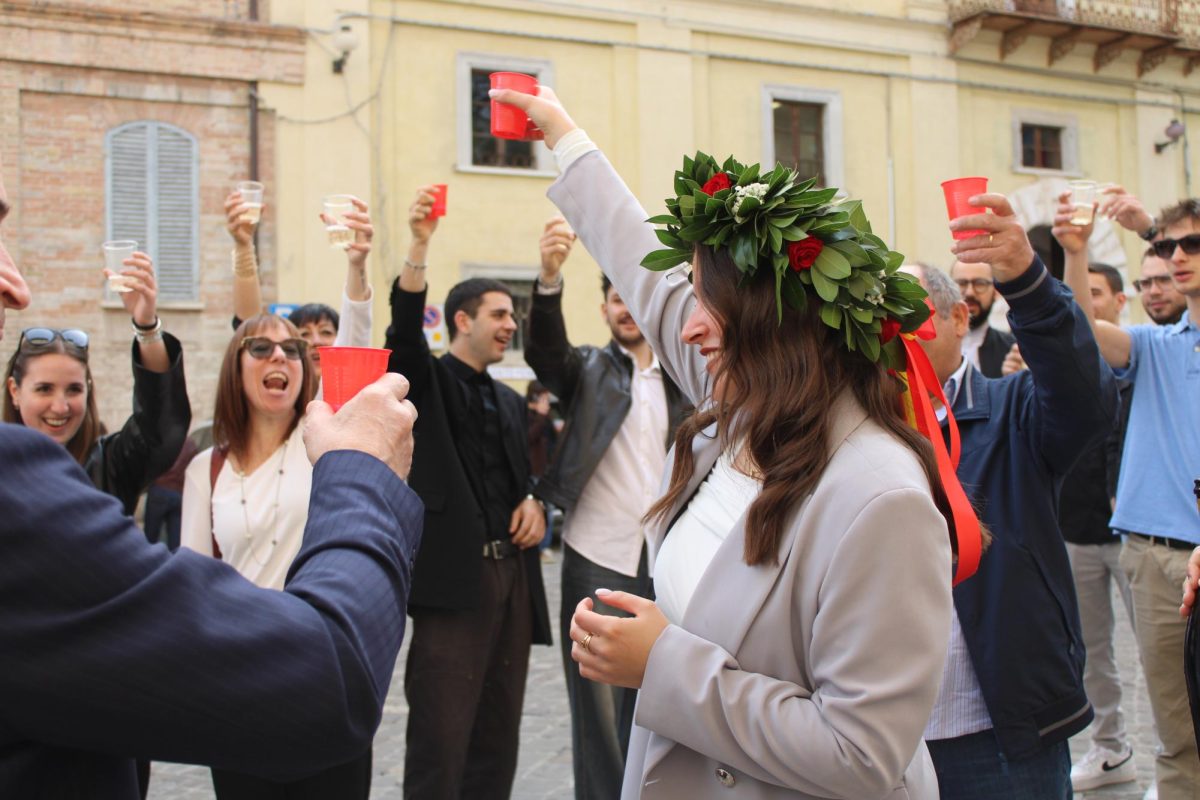


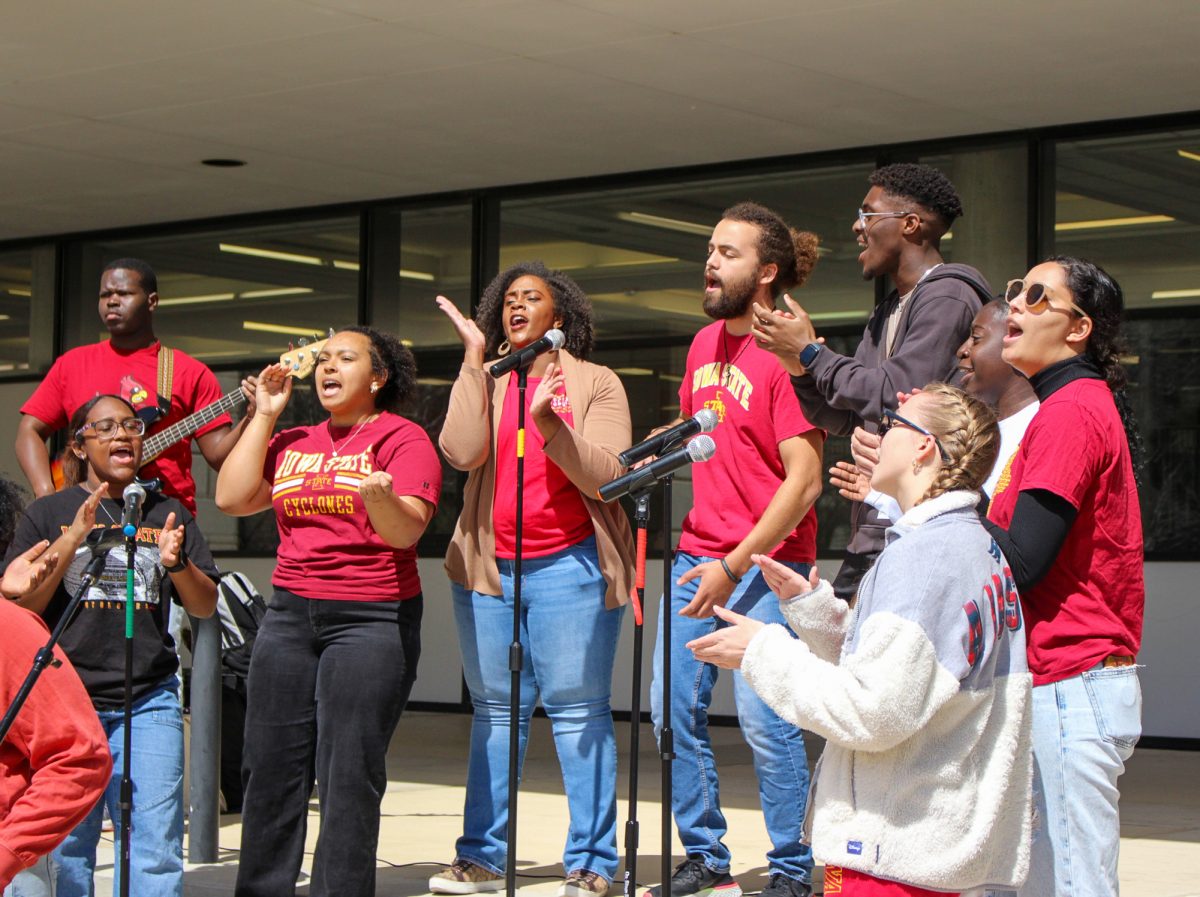










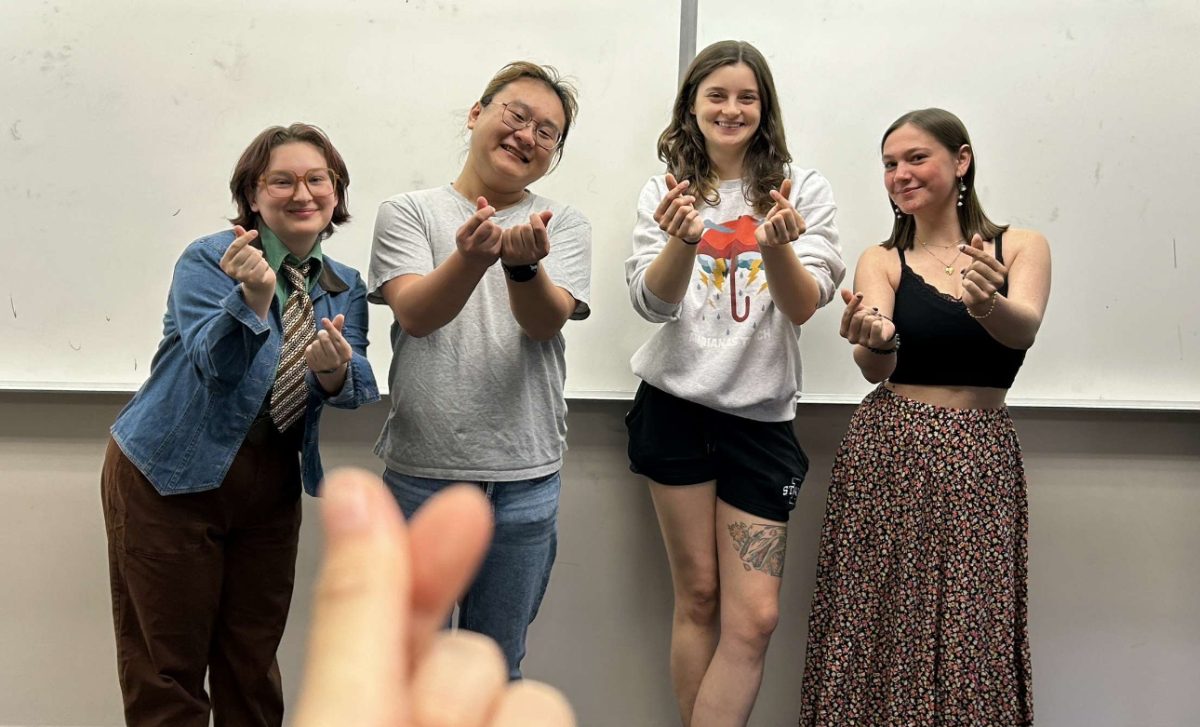


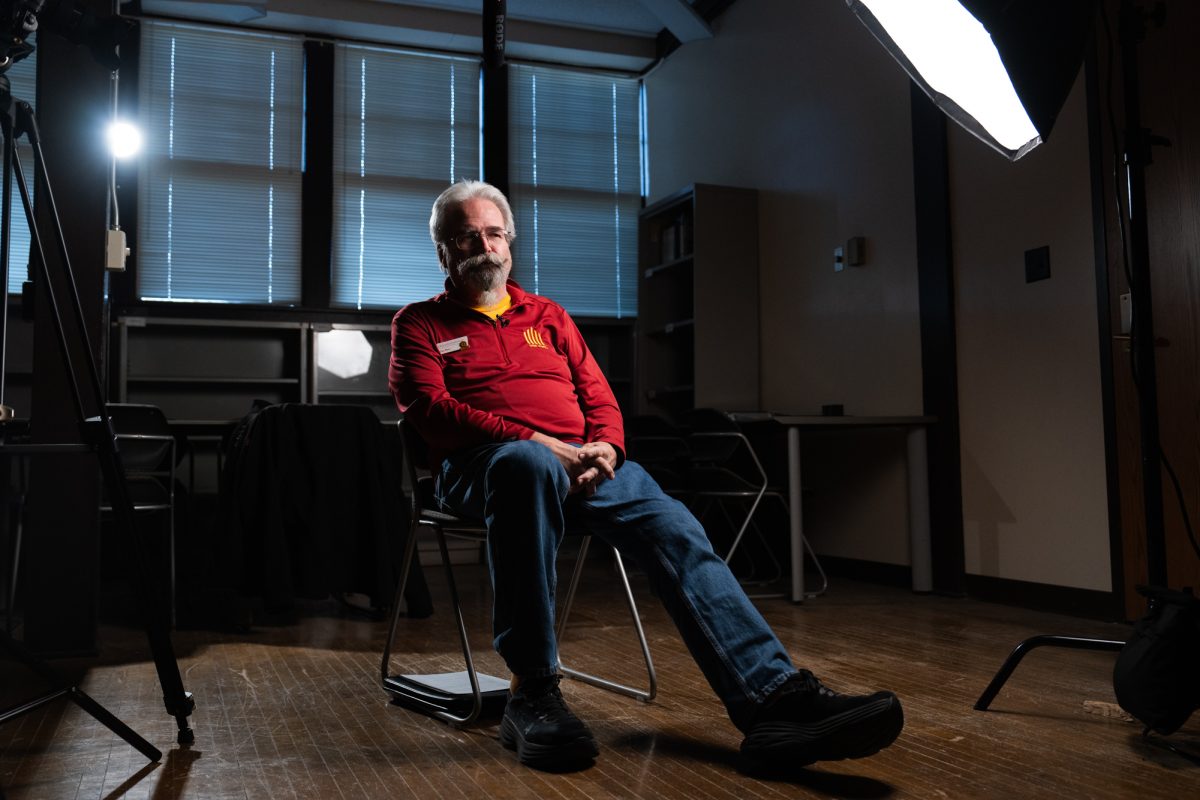
Rhondi Ewing | Apr 22, 2024 at 8:10 am
I was expecting to be disappointed with the content of this article but I actually found the DEI decisions to be very well balanced.